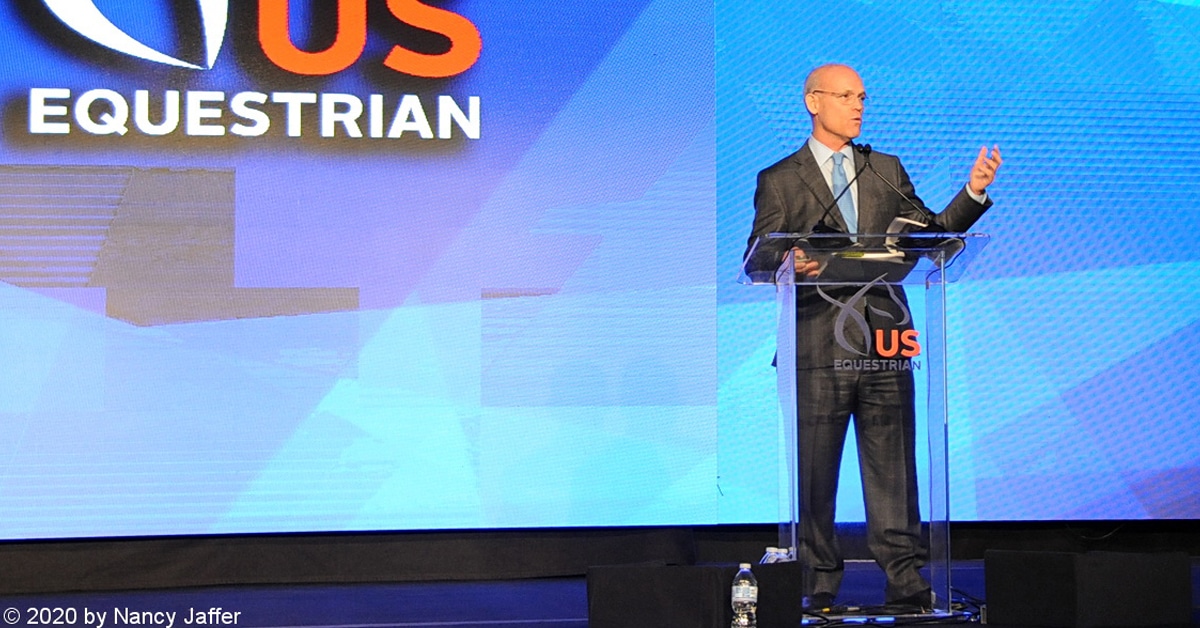With the clock running down on the eventing world championships just nine months away, the U.S. Equestrian Federation will be appointing an eventing task force in the next two weeks to develop a program for the discipline after surveying key players ‒ including riders, coaches, supporters and horse owners ‒ about their concerns.
“The results of our analysis clearly indicated to us that a change was needed in order for restructure of the sport to occur and for it to have its greatest chance of success,” said USEF CEO Bill Moroney, addressing the High Performance forum at the U.S. Eventing Association convention in Albuquerque on Dec. 10.
His appearance at the session had been anxiously awaited in the wake of a startling shake-up. Those involved with the sport were looking for an explanation of the decision announced last week not to renew the contracts of performance director Erik Duvander and Peter Wylde, who coached the show jumping aspect of the sport, at the same time as managing director Jenni Autry was let go by the federation.
Since that happened, people have been looking for answers about what was going on. Until Moroney spoke at the convention, the USEF had remained silent, stating only that “the program structure and plans for the future will be forthcoming.”
Ironically, perhaps, Moroney said one of the key things that needs to be improved in the new approach to eventing is communication, along with stronger leadership and revising how the organizational structure is handled by USEF. He emphasized the need for personal accountability as well.
Moroney would not give a direct explanation about the reason for not renewing the contracts, however.
“Around the area of personnel, we’re just not going to go there with you. I think we need to respect people’s privacy and the federation needs to preserve our business standards as well,” he said.
At the same time, Moroney stated, “One of the key points that made the decision-making even harder was the fact that we knew and recognized through this process that Erik brought a certain element in the training he did one-on-one with people and in groups of people that they really appreciated, and they found a real value in.
“However, the evaluations aren’t done just off of one situation. They are done off the analysis of multiple issues across the board that led us to the place we’re at today.”
He noted, “We also fully understand and respect that not everybody will agree with the decisions we made, but we will hope you will understand and respect the decisions we did make. Maybe not but from the initial perspective you had, but from the reality that we did conduct a robust evaluation and we did make the decisions we felt were necessary to move us forward.”
A questioner asked “Why remove a team that was clearly making progress bringing along high performance riders?” With the world championships so close, the anonymous person said, “It’s like shooting yourself in the foot.”
Moroney agreed recent results at Aachen and Boekelo (the team finished second in both) and Boyd Martin’s victory at the Maryland 5-star “were amazing, but those results were after four years. And are those sustainable? When you look at those results, those were also created by people at the table taking personal responsibility for preparing themselves and their horses to arrive on competition day ready to go.”
Some had coaching from Erik and some didn’t, “but they all came together,” he said, taking note of “the team spirit that was there. Why doesn’t this culture exist out there already?”
In assessing the status of the eventing program, he said USEF has to look at the entire time period from what was proposed in 2017 (when Erik took over) “and the entire spectrum of where the program has gone.”
Eventing actually has been underperforming for years in the view of many (Boyd’s Fair Hill victory was the first U.S. win at the sport’s highest level since 2008), and it is obvious that there is no easy fix.
“This puzzle is very complex and it has a lot of components,” said Moroney. Among them is whether the eventers need a coach/performance director or if the discipline should go the way of show jumping, where Robert Ridland is the technical advisor (though he likes being called the coach). If performance help is needed, he can step in to assist riders because of his performance expertise in the sport, but he doesn’t give those on the team hands-on advice on a regular basis.
Moroney also emphasized that it’s necessary for the owners to have greater involvement. He noted there are underlying currents of mistrust, “of worry about any one person or couple of people having a louder voice than others in the reconstruction.” He expanded on that thought by characterizing “a major lack of trust between high performance riders and the high performance program.”
Citing a need for people to know more, with an emphasis on clarity (a word he prefers over transparency) Bill told his audience that the federation has a responsibility to get information out and be clear about it and “provide people with understanding of what processes are and also to find out how best to communicate with you.”

